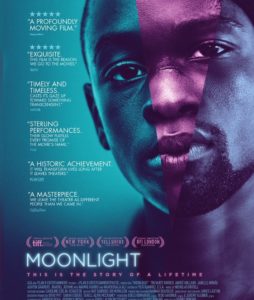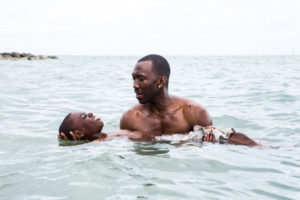
Raw Emotion Strikes a Chord with Universal Themes
Superficially, one might sum up Moonlight by declaring that it presents three chapters of a gay black Miami man’s life. However, the film delves much deeper than that. It’s about growing up in poverty, the struggles of being raised by a crack-addict single mother, the exposures to racism, the need for love, and finally overcoming the complications of having a different sexual orientation than the majority of your peers. Yes, Moonlight is all of this and more. I must admit that it took my undivided attention along with a second viewing to truly internalize all of its beautiful qualities. I adore this film.
The screenplay is written by Barry Jenkins – who also directs – and is based on the play In Moonlight Black Boys Look Blue by Tarell Alvin McCraney. It’s always ambitious in a film to cross over into different time spans; here we see Chiron, the main character, as a child, teen, and adult.

Part 1 is named “Little” and introduces us to Chiron (Alex Hibbert) as a shy, small-for-his-age, loner elementary school child along with crack dealer Juan (Mahershala Ali) and his girlfriend, Teresa (Janelle Monae), with whom he finds solace. His mother, Paula (an almost unrecognizable Naomie Harris, known as Moneypenny from the recent Bond films) is usually drugged up and shows little love or affection towards Chiron.

In structure along with tone, Moonlight has an indie feel as we follow Chiron by use of a hand-held camera through his daily life. Thankfully, he has adult friends who take him under their wings and try to help him. In the best scene in the film, he’s taught to swim by Juan, seen here as a metaphor for a cleansing and/or baptism. It is a beautiful cinematographically filmed sequence; you may even experience goose bumps. This simple skill of learning to swim becomes the unique bond that holds both man and child together, with cementing each other’s trust at its core.

Part 2, “Chiron,” played now by Ashton Sanders, is the hardest part to handle, as he’s now a teen in high school, a victim of his circumstances. The bullies are relentless and sense that Chiron is gay. Juan has died, his mom is addicted to crack, he has a sexual encounter with a boy, a classmate Kevin (Jaden Piner), and immediately, violence breaks out. Kevin is forced to fight Chiron, who is now nicknamed “Black.” The filming of these scenes is shown regarding still photographs in dream-like sequences. Through facial expressions, with no words, we understand the pain and helplessness of Chiron. Jenkins’ skillful eye zooms the camera lens in and out when needed, creating powerful images with no words alongside a haunting score. Jenkins has been quoted as saying he grew up in a similar manner, with a crack-addicted mom and no dad present.
In Part 3, “Black.” Chiron (Trevante Rhodes) is now a man—a shocking transformation as his body is bulked up with a mouth full of shining gold teeth showing, compliments of the grill he wears. He’s moved to Atlanta from Miami and has chosen to live his life by the example he had growing up; he’s become a drug dealer.
Several other outstanding scenes happen in the last part of the film, but I’m not going to spoil it for you. I can tell you that Chiron gives us more reasons to be hopeful at the end of the film than at the beginning. The film is captivating and holds our emotions until the credits roll. The characters are so richly developed, you can’t help but patiently watch what happens.
Again, by crossing over three time periods, we are subjected to an ambitious effort, an outstanding one at that. We can all look forward to seeing the next ventures by writer/director Barry Jenkins.
The Bottom-Line? Moonlight gives us a realistic depiction of a gay teen growing up in a poor neighborhood. To say it is short of a cinematic masterpiece would not be too far off. Beautiful, hopeful and captivating.
Cast: Mahershala Ali (Juan), Ashton Sanders (Chiron as a teen), Alex R. Hibbert (Chiron as a child), Janelle Monae (Teresa), Trevante Rhodes (Chiron as a grown man), and Naomie Harris (Paula).
Credits: Directed and written by Barry Jenkins, based on the play In Moonlight Black Boys Look Blue by Tarell Alvin McCraney.
Studio: A24, Plan B
Run Time: 1 hour 50 minutes
Sarah Knight Adamson© January 14, 2017
